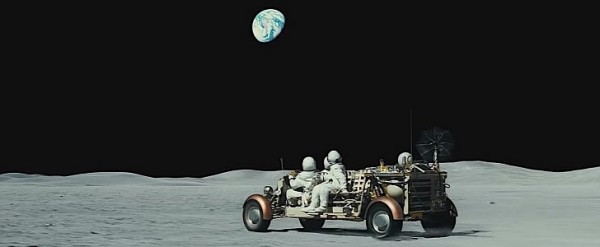Ad Astra (2019)

DIRECTOR: James Gray
CAST: Brad Pitt, Tommy Lee Jones, Ruth Negga, Donald Sutherland, Liv Tyler
REVIEW:
Ad Astra (Latin for “to the stars) joins the likes of Gravity, Interstellar, and The Martian as serious, hard sci-fi space movies that seek to portray with docudrama realism and verisimilitude the realities of space and the difficulties and dangers inherent therein. To that end, it’s aimed at a markedly different audience from the action-oriented likes of Star Wars and Star Trek, and its slow-burn deliberate pace requires a commitment of attention from serious-minded viewers.
In “the near future”, following a power surge emanating from Neptune which causes massive power outages across Earth, elite astronaut Roy McBride (Brad Pitt), a stoic outwardly unemotional man whose pulse never exceeds 80 bpm, is tasked with journeying to first the Moon, then Jupiter—the farthest-flung permanently established base in the solar system—-to attempt to establish contact with a lost science project commanded by his father, legendary astronaut Clifford McBride (Tommy Lee Jones), who was presumed dead but may be responsible for the surges.

Among space movies, Ad Astra is more in the vein of Interstellar than The Martian (although it stays more grounded and never gets anywhere near as trippy or metaphysical), featuring a similar deliberate elegaic pace and some thematic similarity in its focus on a separated parent-child relationship. Gray inevitably uses special effects, but as in Interstellar or The Martian, they exist to serve necessities of the plot and aren’t the focus of it. There’s some great visuals, including the opening showing “the surge” wreaking havoc on an orbital space station, and later scenes on the lunar surface and passing through the dust and rock-filled rings of Neptune, and scenes set in space have the same docudrama verisimilitude of those in Interstellar, The Martian, or Gravity (unsurprisingly, Ad Astra and Interstellar share the same cinematographer, Hoyte Van Hoytema, who often films in closeup on Pitt’s face with the stars reflected in his helmet, both keeping the focus on the main character and accentuating the feeling of being swallowed up in the bleak vastness of space.
The slow burn pace, which some viewers will see as an asset, may disappoint and test the patience of those expecting something more action-oriented. The deliberate pacing demands a commitment of the viewer’s time and attention. Brad Pitt’s dreary narration, which vaguely recalls that of Harrison Ford in Blade Runner (which Ridley Scott removed in his Director’s Cut), is heavy-handed and unnecessary. Most problematic is the climax and the way in which things are resolved, which feels a bit underwhelming for all the lead-up to it, and leaves one with a bit of a feeling of “is that all?”. The film develops at its own pace and the resolution, while logical, might not be what some viewers are expecting. On the one hand, some will admire the way the movie avoids more conventional and predictable tropes, but the way it does wrap itself up is arguably a little too low-key. In fact, some of the most interesting aspects are vignettes on Roy’s episodic journey and some world-building touches, principally his trip to the Moon (whose base includes a Subway restaurant), where we learn there are mining colonies and a no man’s land of disputed territory, leading to a raid by pirates on the military convoy escorting Roy which is a bit reminiscent of the first canyon chase in Mad Max: Fury Road, only with rovers, combatants in astronaut suits, and ray guns. Then there’s a detour involving a response to a mayday from a science ship that features an attack by escaped vicious laboratory baboons, in which Ad Astra briefly turns into a space-based horror movie. But these more action/thriller-oriented moments are few and fleeting, and what Ad Astra is really about at its core is themes involving fathers and sons, obsession, toxic masculinity, and “macho men” like Roy, who have “compartmentalized” their emotions to the point that they are incapable of expressing them, learning to get in touch with their closed-off feelings, with the space voyage essentially as a vehicle for exploring these themes.
Brad Pitt, hot off Once Upon A Time in Hollywood, takes a lower-key, more serious part here; Roy is a stoic, closed-off, emotionally withdrawn figure, but Pitt is able to convey tightly guarded deeper and darker currents churning under his impassive facade. There’s a few recognizable faces in the supporting cast, including Ruth Negga, Donald Sutherland, a bit part from Liv Tyler as Roy’s estranged wife, fleeting walk-on roles from the likes of John Ortiz, LisaGay Hamilton, Kimberly Elise, Loren Dean, and of course Tommy Lee Jones (who apart from a couple video clips doesn’t show up in the flesh until the 11th hour), but no one apart from Pitt is in the movie for more than a few minutes. Negga (as the administrator of the Jupiter base who passes along some revealing information) and Jones (looking more haggard and grizzled than ever) make impressions in their short amounts of screentime, but this is Pitt’s show.
Ultimately, Ad Astra will likely appeal to the same audience who appreciates Interstellar while those who found fault will find some of the same here. My opinion lands somewhere in the middle; there’s plenty of striking visuals and interesting bits, but ultimately lacking that little certain something.
* * *